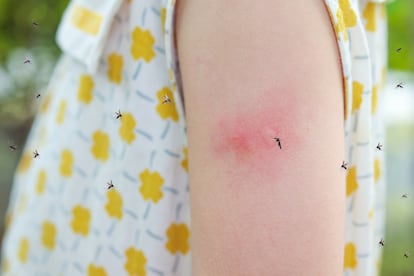How to avoid mosquito bites this summer
Experts explain what most attracts these insects and how best to repel them


Summer has arrived in the northern hemisphere, temperatures are rising and the mosquitoes are back. In addition to being annoying, these insects are also dangerous, as they can transmit numerous diseases. Raimundo Outerelo, professor emeritus of zoology at the Complutense University of Madrid, says that there are some 3,500 different species of mosquitoes in the world. The most common are the common mosquito (Culex pipiens), which transmits West Nile fever, and the tiger mosquito (Aedes albopictus), which can transmit malaria, yellow fever, dengue and Zika. Although this insect is native to Asia, in recent years it has invaded Europe and the Mediterranean.
In 2020, the WHO warned that mosquitoes are responsible more than 700,000 deaths per year worldwide. In Europe, they do not pose a great risk — the main harm they cause is discomfort from their bites — but the continent is not exempt from danger either. Several experts tell EL PAÍS what makes some people more attractive to mosquitoes than others, and how best to avoid being bitten.
What attracts mosquitoes?
Females only bite because they need the blood to reproduce, not to feed. There are several factors that lead them to their victim, and each species has its own preferences. First, they detect the carbon dioxide exhaled by their prey, which tells them where it is, says María José Ruiz, a researcher at the Estación Biológica de Doñana (EBD) in Spain. They also use body temperature to locate their target, but it is the sweat that makes them choose one person or another’s blood to suck.
When we sweat, we secrete a series of chemical substances, such as lactic acid and octanol, which attract these insects, says Ruben Bueno, entomologist and head of Vector Control for Europe at Rentokil Initial in Spain. “Because these compounds vary in each individual, there may be people who are more attractive and those who are less so,” he continues. Most of these elements are produced by bacteria on our skin, so age, sex and being sick can play a role, Ruiz explains, adding that pregnant women are more attractive to mosquitoes.
In some species, the color of clothing has been found to have an influence on becoming a desirable target. For example, the tiger mosquito has been found to be attracted to dark colors, according to Roger Eritja, head of entomology at Mosquito Alert and researcher at the Center for Advanced Studies in Blanes (CEAB). They are also attracted to tight-fitting clothing, adds EBD’s Ruiz.
No two mosquitoes are alike and they have enormous differences in behavior, habits, reactions and appetites”Roger Eritja, head of entomology at Mosquito Alert and researcher at the Center for Advanced Studies in Blanes
Last May, the journal Cell published the results of an experiment in which the authors tested four commercial soaps on different subjects to see if their components changed the volunteers’ “odor fingerprint” to attract or repel these insects. Although washing with the soaps “significantly” modified human body odors, the attraction or repellency of the subjects depended on the interaction between the changes produced by the soap and the specific scent composition of each host.
Other research has pointed to the victim’s blood type and even beer consumption as factors of attraction. However, Eritja points out that these studies are usually done with a single mosquito species and it is difficult to extrapolate the results to other species. “No two mosquitoes are alike and they have enormous differences in behavior, habits, reactions and appetites,” says the CEAB researcher.
How to avoid them?
Experts agree that the best weapon for those who are persecuted by these insects is a good repellent. It is best to buy them in specialized stores or pharmacies and follow the advice on the label “to the letter,” says Rentokil Initial’s Bueno. Their effectiveness depends on personal odor, which must be taken into account. Therefore, we must identify how much we attract mosquitoes and use a higher or lower grade product, says Ruiz.
The lotion should be applied all over the skin. If you don’t, “mosquitoes will find where you haven’t put the repellent and will bite you there,” Eritja says. In addition to these products, it is also advisable to wear long sleeves if leaving home early or late in the day or going to an area where there is likely to be a concentration of these insects. For example, if you go for a walk in the countryside, says Jordi Figuerola, research professor at the EBD. Ruiz adds other tips such as wearing loose-fitting clothing and setting up mosquito nets at home.
When a mosquito bites us at home, most of the time “it was born in our house or in our neighbor’s house,” says Figuerola. The entomologist explains that the main thing is to avoid having places in the home where they can reproduce. These insects need water to lay their eggs and develop, so it is advisable to keep an eye on any container where water may accumulate. For example, dishes under flower pots, birdbaths, buckets, and air conditioning drain pans.
Eritja, from CEAB, warns of certain products that are sold as measures to repel these pests and avoid their bites, but that do not really work or whose effectiveness is limited. The researcher states categorically that ultrasound mosquito repellent devices are “completely ineffective, a placebo. Their efficacy has never been proven.”
Candles and citronella bracelets are also not the best option, the researcher adds. Although the substance can act as a natural repellent, the amount needed for it to work is “very high,” he points out. Eritja suggests eucalyptus oil for those who prefer a more natural product as opposed to commercial repellents.
Mosquitoes and climate change
Climate change may pose a dilemma for mosquitoes. On the one hand, the planet’s increasingly higher temperatures make it easier for them to proliferate. The increasingly warmer winters make their activity period longer and when spring arrives there are more mosquitoes to reproduce, says Figuerola. If cold does not control populations, the likelihood of pathogen transmission increases, he continues. However, a climate that is too hot also does them harm, because they are not able to regulate their body temperature, Eritja says.
Drought, on the other hand, reduces the amount of water available, which is necessary for reproduction and for their larvae to develop. This would make breeding very difficult for some species that need large amounts of standing water in which to lay their eggs. The phenomenon will be less noticeable for urban mosquitoes, which are highly adaptable. “If it doesn’t rain, there will be fewer containers with water in them and fewer mosquitoes, but if we refill them, we mitigate the effects of the drought by providing water manually,” says the CEAB researcher.
Technology as an ally: Mosquito Alert
One of the most serious problems for these insects, in addition to climate change, is the arrival of invasive species. One of them is the tiger mosquito. Their arrival in Spain meant the transmission of diseases that had not been present in the country until then, according to Figuerola.
The Mosquito Alert application was created almost 10 years ago with the objective of detecting these invasive species. It is an application (a public science project) that allows users to post photos of mosquitoes, bites, or possible breeding sites, which entomologists analyze to recognize and locate the species, says Eritja, a member of this team.
In addition to the tiger mosquito, they also look for the yellow fever mosquito (Aedes aegypti), the Korean mosquito (Aedes koreicus), the common mosquito (Culex pipiens), and the Japanese mosquito (Aedes japonicus). The last species was found for the first time in 2018 thanks to a citizen from Asturias, northern Spain. In early June, the Mosquito Alert team launched a joint campaign with the Ministry of Health that aims to raise awareness of the application. They also work with the administrations of other countries such as Italy, the Netherlands, Austria and the United States.
Sign up for our weekly newsletter to get more English-language news coverage from EL PAÍS USA Edition
Tu suscripción se está usando en otro dispositivo
¿Quieres añadir otro usuario a tu suscripción?
Si continúas leyendo en este dispositivo, no se podrá leer en el otro.
FlechaTu suscripción se está usando en otro dispositivo y solo puedes acceder a EL PAÍS desde un dispositivo a la vez.
Si quieres compartir tu cuenta, cambia tu suscripción a la modalidad Premium, así podrás añadir otro usuario. Cada uno accederá con su propia cuenta de email, lo que os permitirá personalizar vuestra experiencia en EL PAÍS.
¿Tienes una suscripción de empresa? Accede aquí para contratar más cuentas.
En el caso de no saber quién está usando tu cuenta, te recomendamos cambiar tu contraseña aquí.
Si decides continuar compartiendo tu cuenta, este mensaje se mostrará en tu dispositivo y en el de la otra persona que está usando tu cuenta de forma indefinida, afectando a tu experiencia de lectura. Puedes consultar aquí los términos y condiciones de la suscripción digital.








































